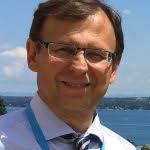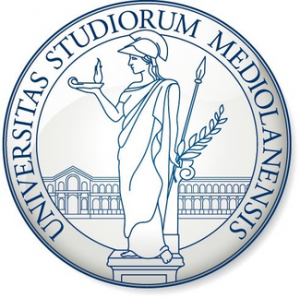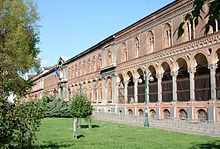The Global Health Centre - GHC, a founding component of the new MACH (MultidisciplinAry ResearCh in Health Science) of the University of Milan established with the support of the Fondazione IRCCS Ca’ Granda Ospedale Maggiore Policlinico, is the first of its kind in Italy as it merges didactics and research towards “ensuring healthy lives and promoting well-being for all at all ages” (the United Nations’ Sustainable Development Goal 3 target). It aims at becoming a comprehensive and impactful contributor to the global health discussion internationally. The GHC is directed by Professor Mario Raviglione. Find here a PEAH interview to him.
Professor Mario Raviglione*
It is through the education of future decision-makers and leaders that health and access to it will be prioritized in every sector when choices are made. To put it in simple words, we aim at building ‘health-sensitive’ young generations of professionals
Interview
Professor Raviglione, the Global Health Centre – GHC is a founding component of the new Centre for MultidisciplinAry ResearCh in Health Science (MACH) and inspires its visionary aims. In this connection, can you tell us more about the MACH?
The new Centre for MultidisciplinAry ResearCh in Health Science (MACH), devoted to the sciences related to the health of populations, established in 2019 at the University of Milan, aims at becoming an international landmark and leading centre for health research. The special interest in infectious diseases, given the background of most of his founders, is complemented by that towards emerging global health threats, including non-communicable diseases, all seen through a global, equitable and multi-disciplinary perspective.
The Institute researchers tackle global health challenges, such as those determining illness and suffering among the poorest and marginalised populations, as well as those that can be faced through innovative biomedical solutions from research in immunology and microbiology. The MACH is truly a brand-new model of collaborative research in our country created with the support of the Fondazione IRCSS Ca’ Granda Ospedale Maggiore Policlinico that will offer its premises to host it.
Back now to GHC and its broad vision
GHC is engaged in addressing the principles and scope of global health, facing inequities and aiming at improving access to “health for all” through didactic and research activities conducted in partnership with experts from other national and international centres and institutes, nationally and internationally, sharing similar.
As for GHC’s ultimate goal?
GHC’s ultimate goal is to contribute to the development and implementation across disciplines, in full alignment with the United Nations Sustainable Development Goals (SDGs) 2016-2030, of sound health policies and practices that ensure universal access to care and prevention for the most vulnerable people in Italy and the world. To achieve this, multidisciplinary research and education engaging young generations of students that will become future leaders and decision-makers are essential. The GHC has therefore some basic functions.
Which are these functions?
The GHC has two clear-cut and well-defined functions. The first is Training and Education in global health: to create a cadre of future passionate leaders capable of being “global health-sensitive” among committed students from different backgrounds, including biomedical sciences, economics, law, international relations, sociology, ecology, agronomy and all other related fields. As part of this programme, at University of Milan teaching on the essentials of global health is now integrated as a module into the regular medical student curriculum, a unique situation in Europe. In 2019-20, we will also begin teaching the principles of global health to students of other non-medical faculties. The other real innovation is a new 1-year post-graduate Master Specialty Course in Global Health tht will start in late 2019 in collaboration with experts from prestigious academic institutions nationally and abroad. This is the very first in Italy and one of the few available in Europe. The second is Research to contribute to identification of innovative ways of handling complex public health problems looking at research as a continuum from the laboratory and fundamental research to operational and policy-related investigations.
In addition, two other functions derived from the main two include (i) contribution to making health policies focusing on that evidence generation that influences policy making by health authorities; and (ii) health promotion and advocacy to pursue public awareness and understanding of global health values and healthy behaviours through students towards civil society.
Kindly, add details relevant to the under-graduate module in Global Health and the coming post-graduate Master Course in Global Health
As mentioned above, the GHC staff has introduced teaching in global health for under-graduate students at University of Milan by integrating it into the regular medical student curriculum; second, the new Master Course in Global Health has been established for those who want to pursue a career in global health. Both are coordinated by myself in close collaboration with the team of Professor Andrea Gori. The under-graduate teaching – the first of its kind in Italy and an innovation in Europe – consists of a module, that is adapted to the level of students, focused on the essential knowledge of the big themes of global health as part of the mandatory courses of Public Health and of Introduction to Medicine in the Medical School curriculum. In essence, we teach to first-year medical school students as well as to those in their 2nd, 4th and 5th year enrolled in the course of Public Health (and Hygiene, as it is often still called in Italy). As of 2019-20, we will also start teaching the principles of global health to economics and management students, as I do already at the health management course at Bocconi University. This is an attempt to make other future professionals more “health-sensitive”, so that one can count on their understanding of the concepts of universal access, vulnerability, social and economic determinants, etc when making general policies in the future. It intends to address the fact that health is the result of choices made in many other sectors beside the biomedical one.
As for the Master Course in Global Health (MGH), organised by us at GHC through a joint initiative with colleagues at MACH led by Prof. Gori and with the precious collaboration of Giulia Rolla, and financially supported also by Intesa SanPaolo, it is a professional, specialty master of 1-year duration offered by the University of Milan in close collaboration with experts from major institutions world-wide, including University of Geneva, Karolinska Instituten, Columbia University, Graduate Institute Geneva, Swiss Tropical Medicine Institute, World Health Organization and others such as San Raffaele Hospital, Niguarda Hospital, University of Brescia, University of Sassari, Bocconi University, CUAMM etc. The first year will begin in early November 2019 and end a year later. In a few words, the new master course aims to deepen knowledge and study contemporary global health issues from an interdisciplinary and inter-sectorial perspective. The MGH, conducted in English language, is open to post-graduate students from Italy and abroad coming from a variety of different backgrounds: from health and biomedical sciences to economics, sociology, anthropology, international relations, law, ecology, agronomy, diplomacy, political sciences, management etc. The MGH mission is to provide students the toolbox to understand and analyse health issues with a focus on both their broader determinants and direct causes, while looking for innovative solutions that transcend sectors. The Master aims to prepare students and future leaders to work in different settings that include the public sector at national (e.g. ministries of health, foreign affairs, development cooperation, etc.) or local level (e.g. regional or district public health authorities), international organizations, nongovernmental and faith-based organizations active in health and development, public private partnerships, and the private sector engaged in health.
Will students have the opportunity to go outside of the school class and see the realities of the world today when it comes to the way of managing global health issues?
Certainly! The Master Course will include a week of simulations of monitoring and support visits to high-disease burden countries, led by the team of Prof. G.B Migliori of the WHO Collaborating Centre based at Fondazione Maugeri, Tradate, Italy, and conducted in the peaceful Valtellina mountains, in a sort of retreat format. Further, the master course will allow students to rotate through major institutions in Milan, such as Niguarda and San Raffaele Hospitals, and learn the significance and applications of modern “omics”, so that they are ready to face ethical and technological issues. And, very importantly, the master course includes a rotation of one month for all students to low-income settings of Africa such as Cameroun, thanks to a collaboration with the national government through the University of Geneva, and Pemba, in the U.R. of Tanzania, also thanks to the collaboration with the local government through the Fondazione Ivo De Carneri, Milan, Italy.
Eventually, what about global health research at the GHC?
Global health research is an ongoing programme that explores innovative ways of handling complex public health problems, embracing innovations in technology and epidemiological understanding, and exploring implementation challenges. The programme works with experts from partner institutions in Italy and world-wide and focuses on priority conditions in infectious diseases and beyond, determinants of health, and innovations in delivery of care and prevention. GHC priorities in global health research include:
- Innovations and new technologies in the response to major killers like tuberculosis and HIV
- Poverty, migration and vulnerability as socio-economic determinants of access to health
- Translation of technological advances into policy and practice
In concrete terms, I am working now on projects related to migrant health issues, the definition of “precision global health “, which is a new concept under development by important global health experts in Europe, policies for new drug development for which we have a grant from the European Union, and some specific challenges in the global fight against tuberculosis, that is my old passion and area of expertise.
Thank you Professor Raviglione for your enlightening answers and highly commendable engagement
————————————-
* About Professor Mario Raviglione
Mario Raviglione graduated from the University of Turin and specialised in the USA (Cabrini Medical Centre, NY, and Beth Israel Hospital at Harvard Medical School, Boston) in internal medicine, infectious diseases and AIDS. He was director of the Global Tuberculosis Programme at the World Health Organization, Geneva, between 2003 and 2017. He is Full Professor in Global Health and Director, Global Health Centre, at the University of Milan and holds the appointment of Professeur Titulaire at the Global Studies Institute of the University of Geneva, Switzerland.
Contact: mario.raviglione@unimi.it



